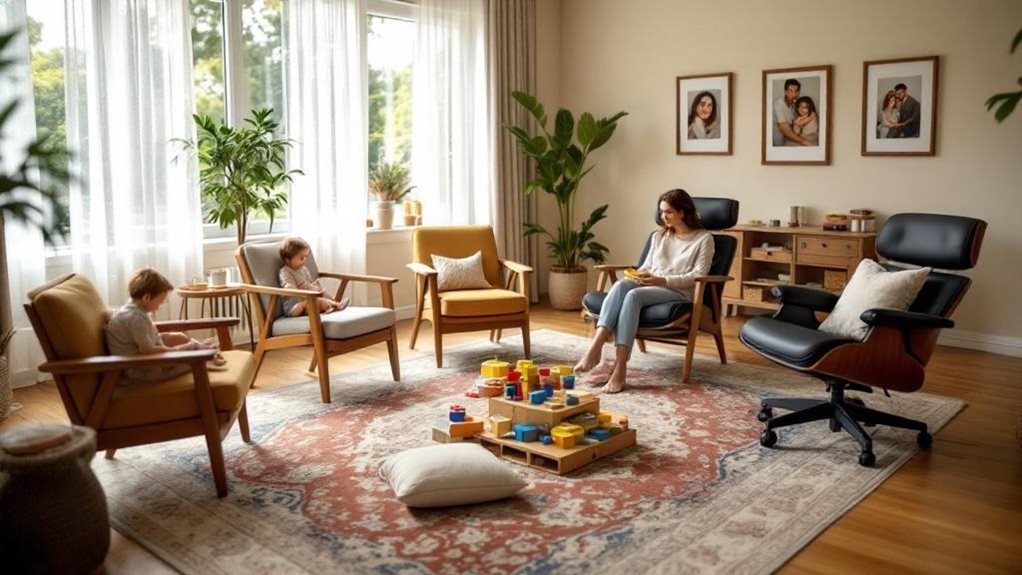Physical Address
304 North Cardinal St.
Dorchester Center, MA 02124
Physical Address
304 North Cardinal St.
Dorchester Center, MA 02124

Key breakthroughs in family therapy for ODD children reveal why traditional methods failed and how modern approaches achieve remarkable results.
You’ll discover that family therapy for ODD has transformed from focusing solely on individual children to embracing entire family systems. Early approaches emphasized anger management through one-on-one sessions, but research revealed their limitations when family dynamics remained unchanged. Today’s evidence-based treatments like Parent-Child Interaction Therapy target both child behaviors and family patterns, incorporating positive reinforcement, collaborative problem-solving, and real-time feedback. This systematic shift has notably improved treatment outcomes and long-term behavioral changes for children with ODD.
While early treatment approaches for Oppositional Defiant Disorder focused primarily on individual psychotherapy with the child, this narrow lens often fell short of creating lasting behavioral change. You’ll find that traditional therapy emphasized anger management and emotional expression at the individual level, but research revealed considerable limitations when family systems remained unchanged.
This recognition sparked shifting paradigms in ODD treatment. Evidence consistently showed that family dynamics play a vital role in maintaining or escalating oppositional behaviors. When you address only the child’s symptoms without considering dysfunctional family interactions, you’re missing essential contributing factors.
Studies demonstrated that including family members in therapy markedly increased treatment effectiveness. You can achieve better long-term outcomes by targeting the child’s entire social system holistically, addressing parent-child relationships and family communication patterns rather than focusing solely on individual symptom management. Modern treatment approaches also incorporate parenting skills training to help parents develop consistent and positive discipline strategies that support the therapeutic process.
Evidence-based interventions for ODD center on structured, systematic approaches that target both child behaviors and family dynamics simultaneously. You’ll find that core techniques like Parent-Child Interaction Therapy (PCIT) provide live feedback to help you develop effective responses to challenging behaviors while strengthening your parent-child bond.
These evidence interventions emphasize positive reinforcement over punishment, teaching you to redirect attention from negative to desired behaviors through labeled praise. You’ll learn collaborative problem-solving skills that encourage your child to work with you in identifying solutions rather than defaulting to defiant responses.
Social skills training complements family-focused approaches by addressing your child’s interaction difficulties with peers and adults, while structured parent training programs like token economies help you implement consistent behavioral management strategies effectively. Since symptoms typically emerge by age 8, early implementation of these therapeutic interventions becomes crucial for establishing positive behavioral patterns before defiant behaviors become more entrenched.
Success in family therapy for ODD requires concrete measurements that track both immediate behavioral changes and long-term family functioning improvements. You’ll observe success indicators through reduced defiant episodes, improved anger management, and healthier emotional expression in children. Behavioral metrics demonstrate progress when you see enhanced communication patterns, stronger parent-child relationships, and better school performance.
Your therapeutic outcomes improve greatly when you deliver treatment in home settings, increasing family participation and follow-through. Parent training becomes essential—you’ll notice that families with consistent parenting techniques and strong adherence to therapy recommendations achieve sustained improvements. Traditional disciplinary approaches like time-outs and grounding often prove ineffective for children with ODD, requiring therapists to develop alternative behavioral management strategies. Follow-up assessments reveal that early intervention prevents progression to conduct disorder while building long-term family cohesion. These measurable changes confirm that extensive family therapy creates lasting positive transformations for ODD children.
As traditional family therapy methods continue proving effective for ODD children, innovative approaches now integrate cutting-edge technology to enhance treatment outcomes and accessibility. You’ll find virtual reality therapy creates immersive environments where children practice social skills in controlled scenarios, while mobile apps enable real-time behavioral tracking and progress monitoring. Gaming therapy transforms learning into engaging experiences that teach problem-solving and cooperation skills your clients actually want to participate in.
Animal assisted therapy provides unique emotional connections that facilitate breakthrough moments in treatment. You can now combine these innovative tools with established approaches like Parent-Child Interaction Therapy and Multisystemic Therapy. Telehealth sessions increase accessibility, while AI-enhanced analysis helps you personalize treatment plans. These hybrid models don’t replace traditional methods—they amplify their effectiveness for families you serve.
While innovative technologies and cutting-edge methods offer promising solutions for treating ODD children, their benefits remain out of reach for countless families facing significant barriers to accessing care. You’ll find that geographic isolation, financial constraints, and cultural stigma create substantial obstacles for those who need help most.
Home-based interventions and community programs can eliminate transportation barriers while reducing stigma associated with clinical settings. You can expand your reach by developing cultural competency skills and partnering with schools, pediatricians, and community health workers. Community outreach efforts raise awareness in marginalized populations where knowledge about ODD treatment remains limited.
Training paraprofessionals, implementing brief manualized protocols, and advocating for insurance reforms will help you serve more families effectively while maintaining evidence-based quality standards.